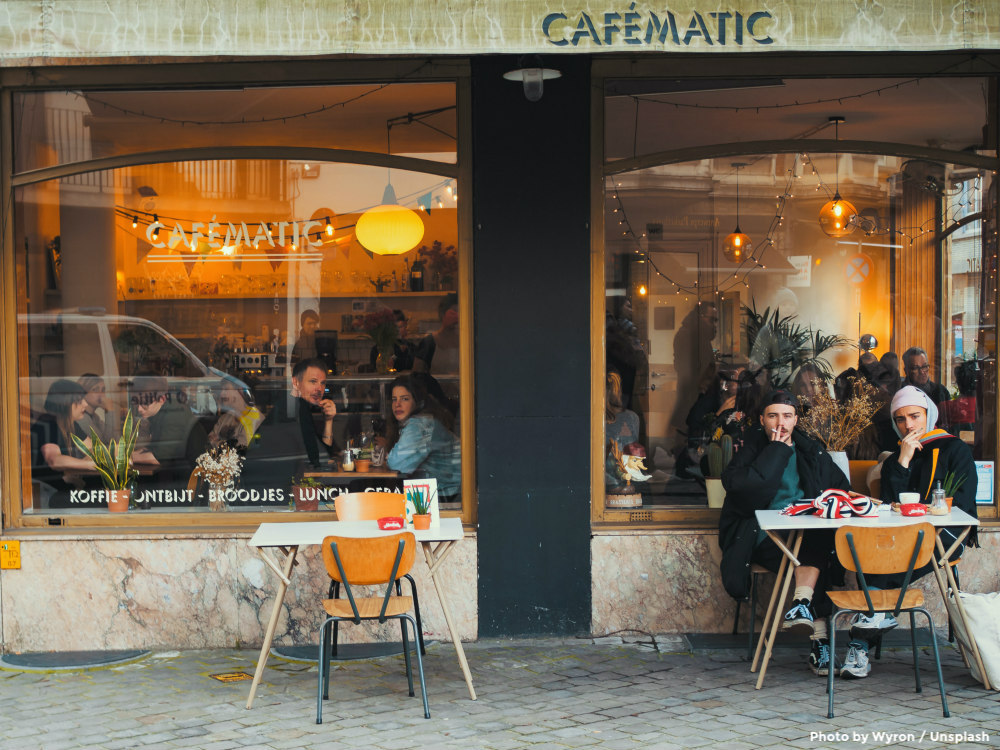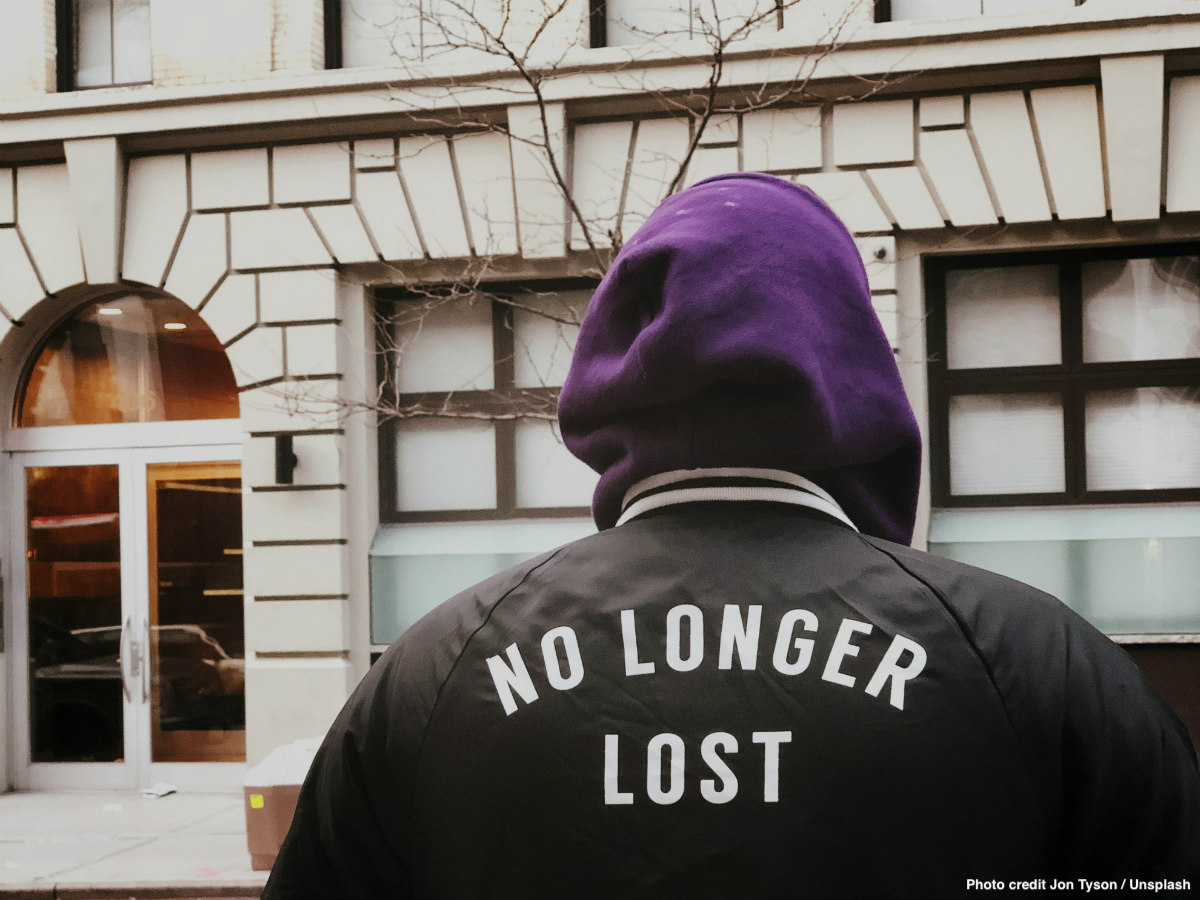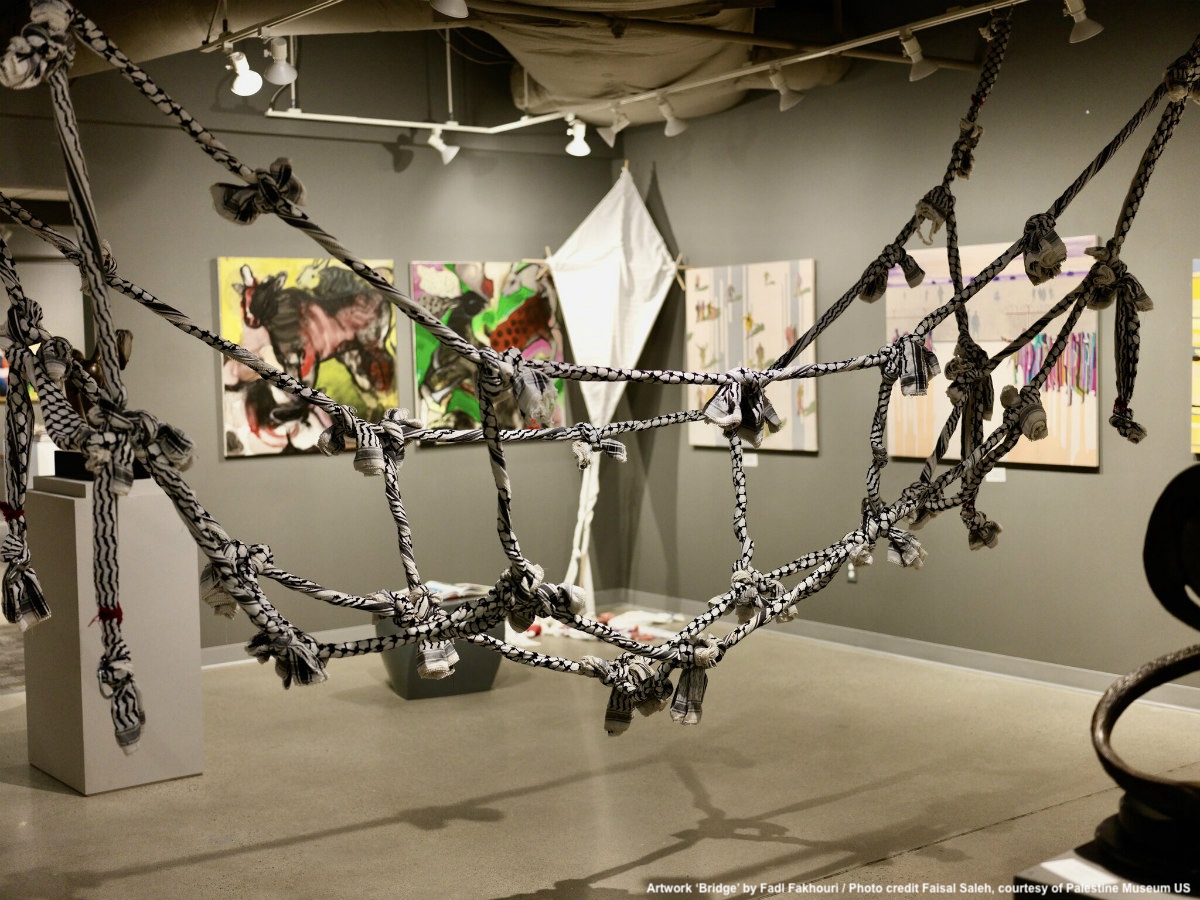Who hasn’t heard of the great Italian idea ‘café sospeso’? In Napoli you can walk in a cafe and have a coffee for free. Someone has already paid for it in advance. That client ordered a sospeso or a ‘pending coffee’, paying the price of two coffees but consuming only one. This anonymous act of kindness in the city is embedded in Napoli’s culture.
The idea of solidarity through coffee has travelled to cities around the world. ‘Suspended meal’ initiatives today range from a cup of coffee to a meal from Barcelona to Dubai to Hong Kong to Buenos Aires. However, initiatives in some cities go beyond a beverage donation.
In Berlin since 2011 the non-profit campaign ‘Flying Coffee’ is basically using free coffees as a way for needy citizens, who are socially disadvantaged, to have access to cafes and thus to participate in social life.
Similarly, in Munich an initiative with the same spirit started in 2015 under the name ‘Brot am Haken’ (translated in English ‘Bread on the hook’). A customer pays for two pieces of bread but only takes one. The voucher hangs on a ‘pay it in advance’ board waiting for somebody who needs it. Founder Michael Spitzenberger, together with Susanne Eckes and her husband Marc Eckes, developed the whole concept for Munich inspired by a Turkish bakery in Hamburg, which has replicated this ancient idea from Istanbul called askıda ekmek.
Later, they renamed it ‘hey’ to remind people that the initiative is a welcome call for all citizens. A call for solidarity and cooperation. ‘Everyone may give, everyone may receive’. Of course, it is mainly people in need who take this gift, but the fact of leaving the term open gives them a feeling of belonging to society. The initiative underlines the importance of local cafes and bakeries to connect people in need with social life.
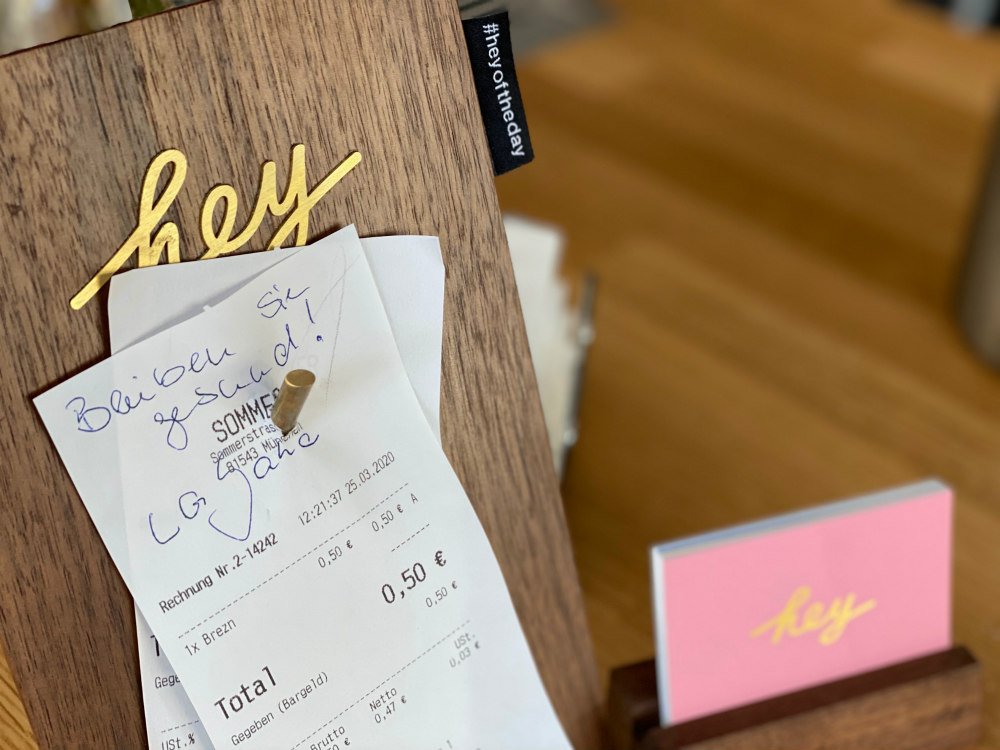
‘The initiative is a joyful, a respectful gift for people coming together, says Spitzenberger, a profound advocate for a diverse city at heart. When you see an old lady sitting next to hipsters in a local cafe, the enthusiasm is contagious’.
‘At ‘hey’ we don’t want people to feel we are heroes who come to save people in need. We explicitly want to avoid stigmatizing anybody just because they haven’t been lucky enough in life. Here there are no victims. In Germany when we talk about needy people, they are quickly categorized as outside of society’. In that sense, anybody is welcome to take a meal or coffee from the ‘pay it in advance’ board, even if you forgot your money or whatever the case is.
In fact, I experienced a case like that the other day and the lady was so thankful about the initiative. It keeps the right balance to the term of ‘people in need’. It is all about helping each other.
‘We trust that the ‘pay it in advance’ board reaches the right person at the right time. ‘hey’ stands for the little moments in life that make the world around us a little more loving’.
Kindness can help to heal our cities
‘Fortunately there are numerous NGOs feeding people in need in Munich. One way or the other every person has access to soup kitchens in the city. However, people attending those places are always surrounded by others socially disadvantaged. ‘hey’ offers them an opportunity to participate in the daily life of the city and re-build their self-esteem’ explains Susanne Eckes.
In Munich poverty has reached in particular aged citizens with low retirement pay. To make a month’s end, some commute to other neighbourhoods to pick up bottles with refundable deposits left on the street to make some extra money. They don’t want to be seen in their communities. They are so-called bottle pickers.
I know of an old lady who visits one of our partner cafes every Sunday. She explained to me that she was not taking care of herself because she saw no meaning. Now she feels motivated to dress up and sit in the cafe as a regular client, explains Susanne Eckes.
‘Small businesses have embraced the initiative very positively because they also felt that they wanted to give something back to their neighbourhoods and, in particular, to those ‘invisible’ neighbours. Now due to the lockdown there are many small business owners fighting for their existence’.
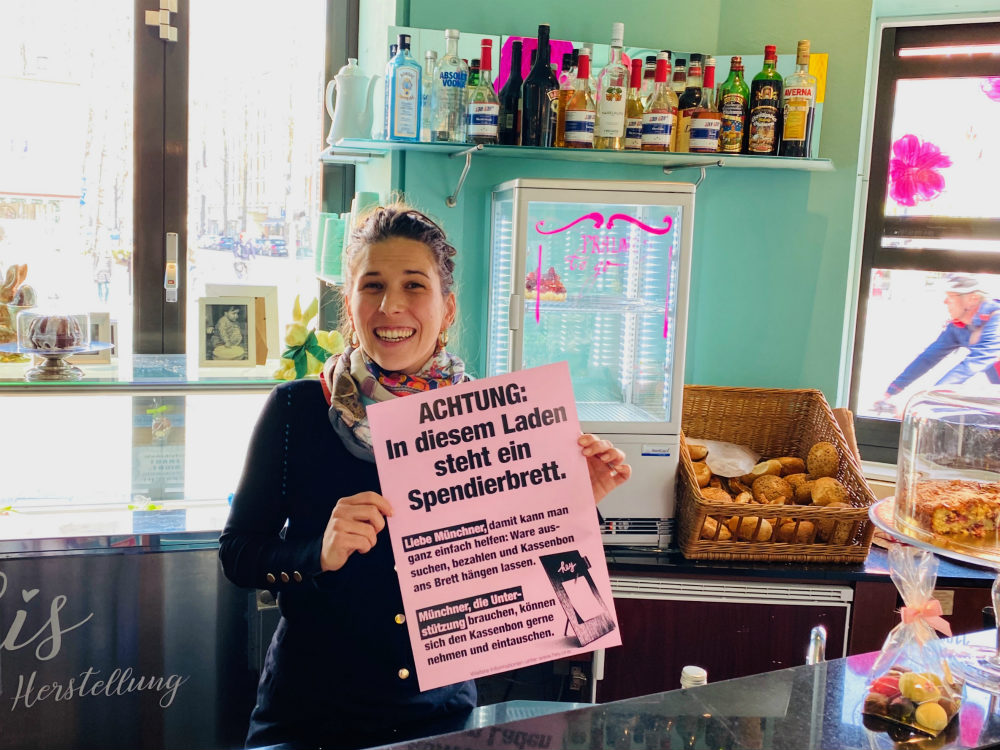
Built on the original idea, currently ‘hey’ has masterminded to support small coffee shops and bakeries to survive through the consequences of the pandemic of Covid-19 by integrating them in a network of food distribution in the city. These are the same bakers and small businesses who wanted to help others in their neighborhoods with the ‘pay it in advance’ board before the pandemie.
With the outbreak of the pandemie soup kitchens have to close in the city because they couldn’t guarantee the security distance among visitors to avoid infections. Many NGOs and churches have been figuring out how to distribute food without people desperately grabbing shoulder to shoulder.
Michael Spitzenberger thought they could use the ‘hey’ network because it is not centralized and therefore avoids masses of people. At the same time it would support small businesses, whose sales are breaking down. If people shop at their local bakery or restaurant for takeaway, they are welcome to buy a coffee, bread, fries or a meal for the ‘pay it in advance’ board.
‘hey’ promotes a culture of kindness in the city where we all win
‘Before the Corona crisis, ‘hey’ was all about social participation and inclusion. But also being there for each other. So these days it is more important than ever to support each other’ claims Susanne Eckes. ‘We have sent to various charity organizations and soup kitchens a list with all the businesses in our network where people can get a meal for free and we have also placed big pink posters on the small businesses’ windows. In adversity people have to notice them at first sight’.
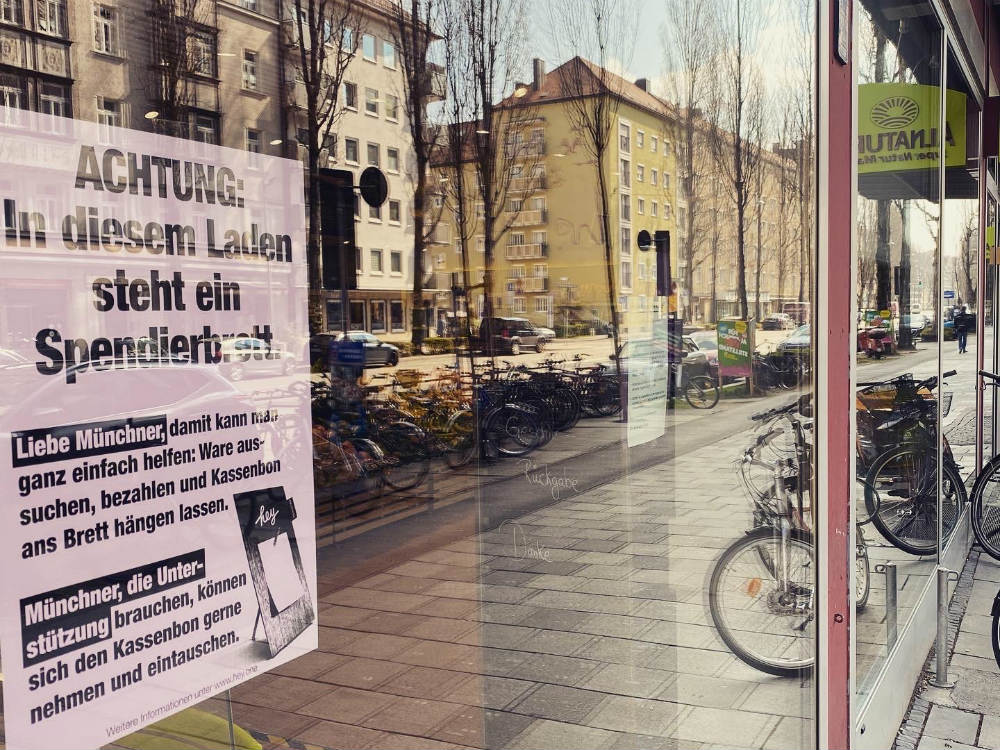
Overall, communication has been one of the most important and challenging aspects of the ‘hey’ initiative. In Napoli caffe sospeso is a matter of course. In Munich you have to keep informing in a way that encourages people in need to walk in regular cafes as regular customers. Bringing these two worlds together is not easy. Poverty makes you invisible in society.
When the lockdown is over and slowly we go back to our regular cafes or bakeries, not all citizens will be able to afford a coffee or a meal at those places, a situation exacerbated due to the consequences of the pandemic. But we want all neighbours getting back into social life.
Caffe sospeso was born in the working-class neighborhoods of Naples during the 30s and 40s when Italy was suffering poverty in cities. This act of generosity had a profound effect on the city culture. It came to stay.
Acts of kindness in the city have come to define the coronavirus pandemic, so hopefully one like ‘hey’ continues to allow people in need to experience a sense of belonging to the daily life of cities. We are all together for all.
Our perception of what is ‘normal’ can transform over time – and this new normal in cities can be a force of good. In psychology they talk about the powerful way that ‘normalisation’ shapes our world.
All that we have to make contagious in cities is kindness.
